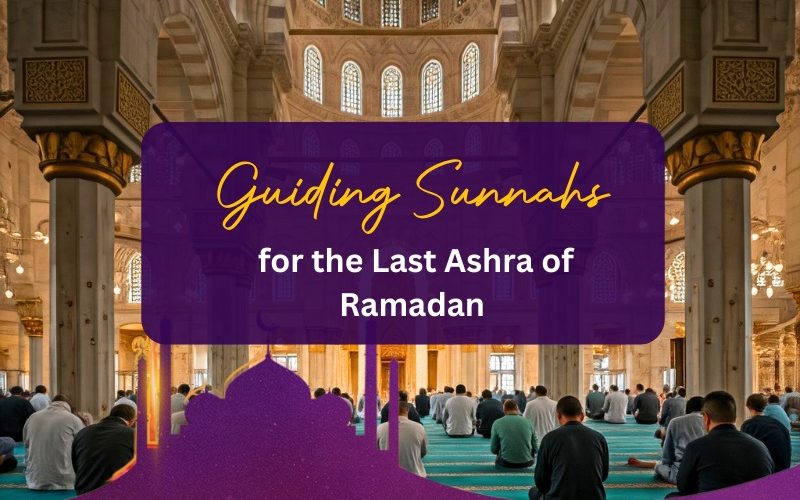The last ten days of Ramadan, known as the last ashra, hold great significance. The importance of these last 10 days is emphasised in the Quran and Sunnah, with the biggest virtue being the revelation of the Quran on one of these nights. Allah (SWT) says in the Quran, “Verily, We have sent it (this Quran) down in the Night of Al-Qadr (Decree)” [97:1].
The Prophet (pbuh) says, “Seek Laylat al-Qadr in the last ten days of Ramadan” [Bukhari and Muslim], hence believers are encouraged to seek this night in the last 10 days of Ramadan through devoted and rigorous prayers.
To fully benefit from the blessed last ten days of Ramadan, here are the Sunnahs you can follow to attain the highest rewards and seek Allah’s (SWT) forgiveness.
Sunnahs to Practice in the Last 10 Days of Ramadan
Aisha (RA), the wife of the Prophet (pbuh), says “I had never known Allah’s Messenger to read the entire Quran in a single night, or to spend the whole night in prayer up until the morning, or to spend a whole month in fasting – except in Ramadan” (Ibn Majah).
- Exert Yourself In Prayer- One way to reap the most benefits of the last ashra is to exert yourself in prayers with devotion, focus, and sincerity. Aisha (RA) says, “The Prophet would exert himself in worship during the last ten nights more than at any other time of the year” (Muslim). This means to clear your mind off any distractions and whole-heartedly perform every act of worship.
- Pray With Your Family- Instead of praying by yourself, encourage the family to wake up and spend the night together in the praise of Allah (SWT). During the last 10 nights of Ramadan, the Prophet (pbuh) would also wake up his wives to pray for a longer portion of the night. Aisha (RA) tells, “During the last ten nights of Ramadan, the Prophet would tighten his waist belt and spend the night in worship. He would also wake up his family” (Al Bukhari).
- Seek Out Laylat al Qadr- Seeking out Laylat al Qadr not only means to dedicate oneself in prayer for the 10 nights but also means to believe whole-heartedly in Allah and in His promise of the reward for devoting oneself to praying for the 10 nights. The Prophet (pbuh) said, “Whoever spends Laylat al-Qadr in prayer, believing in Allah and seeking His reward, will be forgiven all of his past sins” (Al Bukhari and Muslim).
- Observe I’tikaf- I’tikaf is a form of worship when the Muslim stays away from any distraction that may divert his heart from Allah. It involves exerting oneself in prayers by performing dhikr, reciting the Quran, and offering obligatory and voluntary prayers while avoiding all worldly concerns. It is narrated by Aisha (RA) that the Prophet (SAW) used to “observe i‘tikaf for ten days every Ramadan, and in the year in which he passed away, he observed i’tikaf for twenty days” [Al-Bukhari].
Spending the last 10 days of Ramadan following the Sunnah of the Prophet (pbuh) is the best way to maximise prayers and deepen our connection with Allah (SWT). These 10 days are a blessing from Allah (SWT) and we must fully prepare ourselves to make the most of them to seek His mercy and forgiveness.
From Your Zakat to a Saved Life
At Indus Hospital Hospital & Health Network, 70% of patients are Zakat eligible and can avail life-changing medical treatments through open-hearted Zakat donations. It plays a significant role in ensuring that IHHN continues to provide 100% free-of-cost healthcare services to all individuals who need it. It is what allows us to go the extra mile in facilitating all patients and their families with quality treatment procedures and a comfortable environment throughout their time at IHHN.



